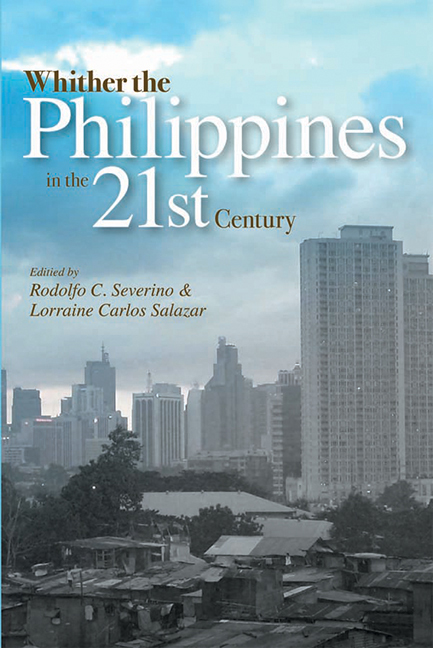Book contents
- Frontmatter
- Contents
- List of Illustrations
- Foreword
- Acknowledgements
- The Contributors
- List of Abbreviations
- Map of Southeast Asia
- 1 The Philippines in Southeast Asia
- 2 From Regime Crisis to System Change
- 3 Proposed Constitutional Reforms for Good Governance and Nation Building
- 4 The Military in Philippine Politics
- 5 Religion and Politics
- 6 The Philippine Press
- 7 Macroeconomic Issues and Challenges
- 8 Investment Climate and Business Opportunities
- 9 Why Does Poverty Persist in the Philippines?
- 10 Diaspora, Remittances, and Poverty
- 11 The Philippine Development Record
- 12 Sancho Panza in Buliok Complex
- 13 The Insurgency That Would Not Go Away
- 14 Whither the Philippines in the 21st Century?
- Index
4 - The Military in Philippine Politics
Published online by Cambridge University Press: 21 October 2015
- Frontmatter
- Contents
- List of Illustrations
- Foreword
- Acknowledgements
- The Contributors
- List of Abbreviations
- Map of Southeast Asia
- 1 The Philippines in Southeast Asia
- 2 From Regime Crisis to System Change
- 3 Proposed Constitutional Reforms for Good Governance and Nation Building
- 4 The Military in Philippine Politics
- 5 Religion and Politics
- 6 The Philippine Press
- 7 Macroeconomic Issues and Challenges
- 8 Investment Climate and Business Opportunities
- 9 Why Does Poverty Persist in the Philippines?
- 10 Diaspora, Remittances, and Poverty
- 11 The Philippine Development Record
- 12 Sancho Panza in Buliok Complex
- 13 The Insurgency That Would Not Go Away
- 14 Whither the Philippines in the 21st Century?
- Index
Summary
INTRODUCTION
Until the imposition of martial law in the Philippines in September 1972, the principles of civilian control and supremacy of civilian authority over the military governed the relationship between the civilian government and the Armed Forces of the Philippines (AFP). As a consequence of the strategy used against the agrarian-based Huk insurgency during the late 1940s to the early 1950s, the role of the military in society slowly expanded beyond the original triad of external defence, internal security, and peace and order to include socio-economic functions. However, the constitutional and institutional framework, including civilian oversight over the military, and a body of civil and political rights that ensured democratic governance, including regular elections, continued to define civil-military relations and the role of the military in Philippine politics.
This changed with Martial Law. The legislature was disbanded, civil and political freedoms were suspended, political parties were outlawed, newspapers and other media outlets were controlled, the private property of Marcos’ political opponents was sequestered on the pretext of their outstanding loans from government financial institutions, and the military became a partner of martial law and authoritarian rule. This partnership lasted some fourteen years, and in its wake left civil-military relations in disarray. More disastrously for democracy, it created in the AFP members an “interventionist” tendency.
This chapter focuses on the military in Philippine politics, particularly the implications of martial law for the country's military, civil-military relations, and democratic governance in general. It attempts to explain the emergence of an “interventionist” role for the military by documenting:
• the military's role expansion without civilian oversight institutions and a democratic political system;
• the role the AFP played in the 1986 and 2001 political successions and in providing political stability and regime survival in the 1980s and at present;
• the military's role in countering communist insurgency and Moro separatism; and
• the absence of good governance which helped shape its “interventionist” role.
- Type
- Chapter
- Information
- Whither the Philippines in the 21st Century? , pp. 78 - 99Publisher: ISEAS–Yusof Ishak InstitutePrint publication year: 2007



